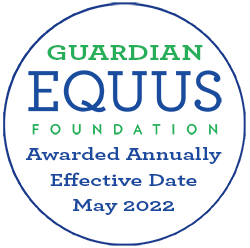Eligibility Guidelines
Although Mane Stream makes every effort to accommodate every person who applies to participate, it is not always possible due to the limitations of our staff, horses and the facility. Be aware that there are several factors used in determining if an individual is appropriate to participate at Mane Stream’s. These include, but are not limited to, the availability of an appropriate horse, as well as a sufficient number of qualified volunteers and staff. We would like you to be aware of the following:
AGE
Participants in the adaptive riding program and summer camp must be at least four years of age. Participants receiving therapy may be any age, but those under the age of two will be carefully evaluated prior to using equine movement. Infants and children under two years of age are encouraged to participate in the clinic.
WEIGHT LIMIT
Each individual horse has a pre-determined limit as to the total weight he or she can carry safely. The total weight is the weight of the participant, plus the weight of the equipment. These limits are determined by a variety of factors and are evaluated and updated by a supervising veterinarian. Each program and/or service has a maximum weight limit.
PHYSICIANS STATEMENT
We cannot allow any person to participant in Mane Stream programs without a signed and dated statement from a physician stating that it is safe for that person to do so.
PRECAUTIONS AND CONTRAINDICATIONS
Be aware that there are existing precautions and contraindications to adaptive riding and therapy.
BEHAVIOR
Disruptive, inappropriate or unsafe behaviors, or any condition where the person is dangerous to himself or to others may be considered a contraindication to adaptive riding or therapy.
SCREENING
A Mane Stream instructor and/or therapist will screen every potential participant on a one-to-one basis, including summer campers. If, in the opinion of the instructor and/or the therapist it is not advisable for the person to participate, we will follow their recommendation. Certain medical conditions are a contraindication to adaptive riding or therapy.
MEDICAL CONDITIONS
Under certain circumstances, a participant’s condition may change leading to an unacceptable level of risk. In this case, the person is asked to withdraw from participating until the condition is stabilized. Participation may be resumed when written verification from the attending physician or therapist states that it is safe to do so. In certain situations it may not be advisable for the person to return to mounted riding. Clinical therapy will continue to be provided to those receiving therapy services.
How do I know which is more appropriate?
Consider the following things:
Does the potential participant require constant support and positioning to be able to maintain sitting balance?
Does the potential participant need frequent assistance to maintain attention or alertness levels?
Is the potential participant under the age of four?
Does the potential participant have special medical needs that may require the knowledge and training from a licensed professional therapist?
Does the potential participant have sensory processing concerns or frequent behavioral outbursts to sensory stimuli?
Does the potential participant have specific neuro-motor goals to work on?
Would the potential participant benefit most from private one-on-one sessions?
If you answered yes to any of the questions above then therapy may more appropriate.
General Precautions
It is important to state that the horses in the Mane Stream program are well-behaved and are trained and conditioned for circumstances that may occur during lessons or therapy sessions, as are the volunteer horse handlers that assist. However, they are still horses, with the nature and innate responses of a horse. Interacting with horses carries risk.
It is the very nature of the horse that makes him useful in adaptive horsemanship programs, equine assisted therapy and other horsemanship program. He is, as dictated by nature, a prey animal and as such is inclined to take cues from an identified leader whether horse or human and be of a docile nature in most circumstances. An exception to this general rule occurs when the horse experiences fear or pain as the horse understands it. It is those situations which may initiate an innate “flight response.” As large prey animals, nature has provided the horse with one defense against a threat: the ability to run from it. As a result, if the horse is put in a situation where he feels fear or pain, he may react with a “flight response” and may place not only the participant in jeopardy, but may also endanger any people or horses in close proximity as well.
Please be assured that while there are elements of risk involved in equine assisted activities or therapy, Mane Stream takes every precaution to ensure the safety of all participants. The staff are knowledgeable and experienced. Mane Stream encourages and facilitates their professional development and continuing education. Mane Stream volunteers must participate in a formal training before actively volunteering and they receive constant regular instruction and feedback from instructors and therapists. The horses are evaluated before being accepted into the program and receive ongoing training. They also are re-evaluated on a regular basis to ensure that they remain appropriate. These elements are indicative of Mane Stream’s diligence to ensure that activities take place in an environment of maximum safety and control. However, it is important that all program participants have an understanding of the nature of the horse and the risks that are inherent in equine assisted activities and therapy.
Thank you for your understanding of these guidelines. Our goal is to provide the safest programs and services possible that are challenging and enjoyable for all participants. If you have any questions or concerns, please feel free to contact us.




